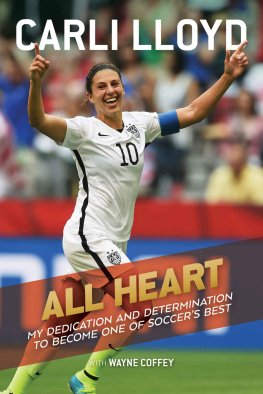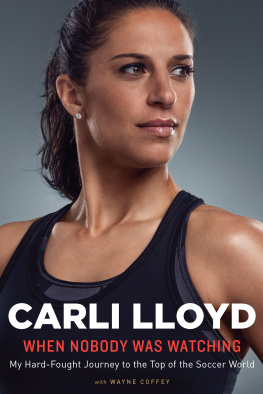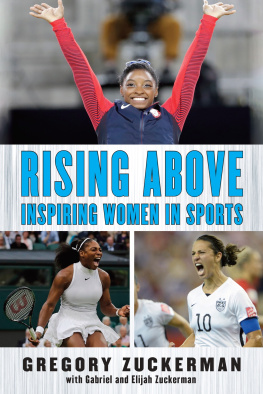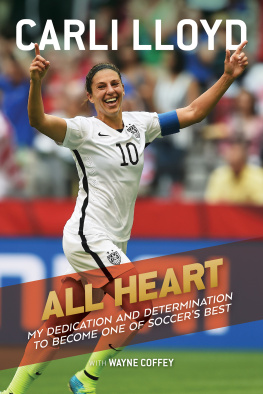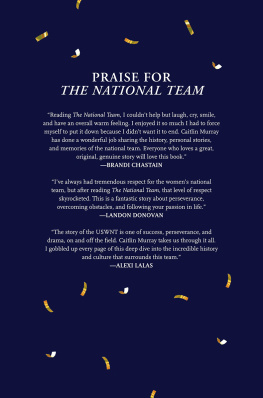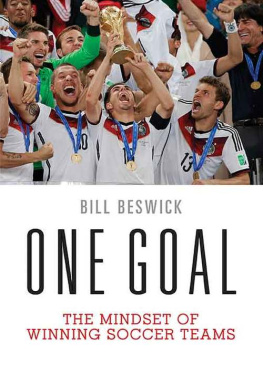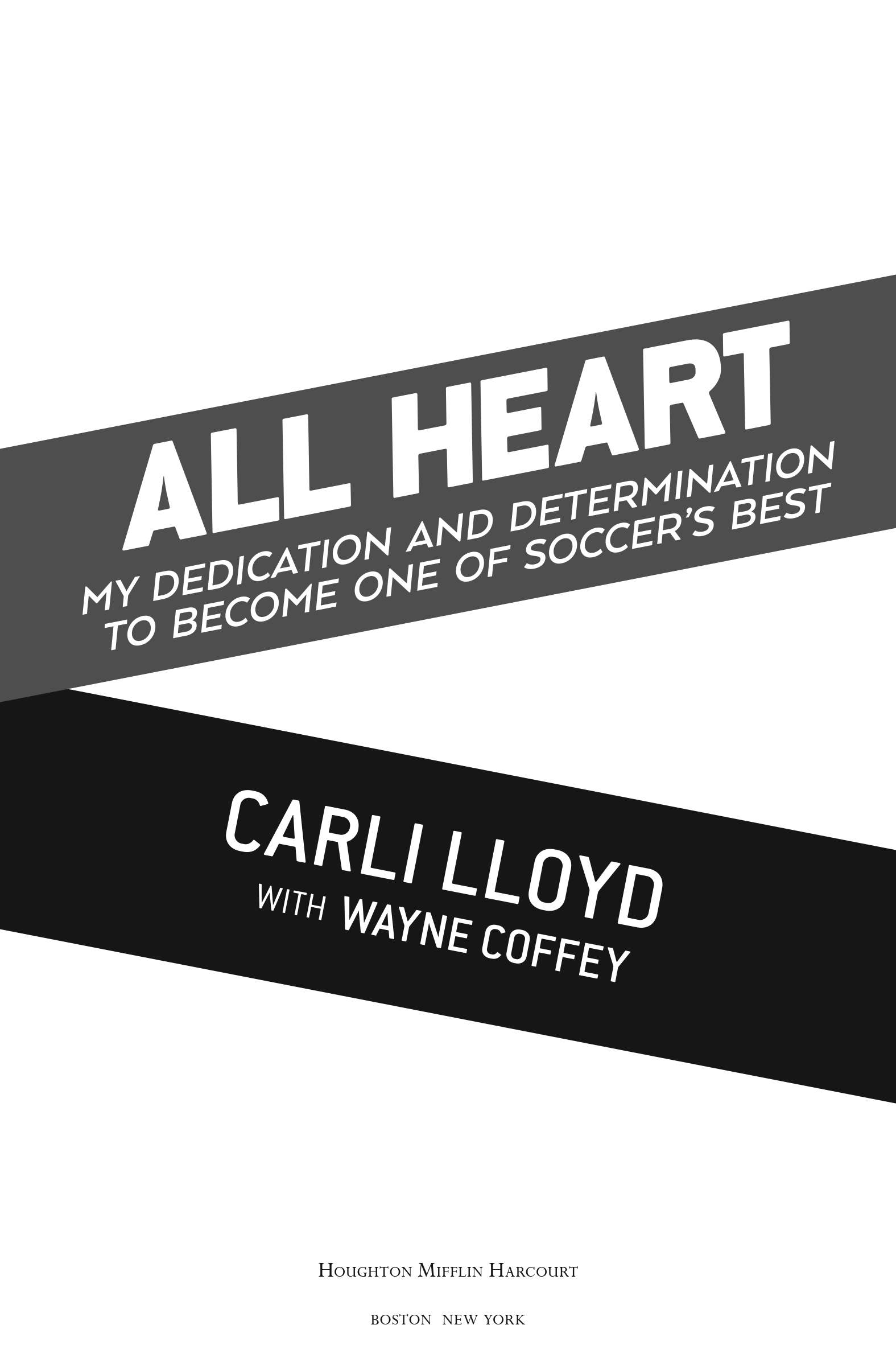Copyright 2016 by Carli Lloyd
All rights reserved. For information about permission to reproduce selections from this book, write to or to Permissions, Houghton Mifflin Harcourt Publishing Company, 3 Park Avenue, 19th Floor, New York, New York 10016.
www.hmhco.com
Front cover photograph 2017 by Stuart Franklin, FIFA/FIFA via Getty Images
Cover Design by Andrea Miller
The Library of Congress Cataloging-in-Publication Data
Names: Lloyd, Carli, 1982 author.
Title: Pure gold / by Carli Lloyd.
Description: Boston : Houghton Mifflin Harcourt, [2016] | Audience:
Ages: 1012. | Audience: Grades: 4 to 6.
Identifiers: LCCN 2016034362| ISBN 9780544978690 (hardcover) | ISBN9781328695703 (e-book)
Subjects: LCSH: Lloyd, Carli, 1982Juvenile literature. | Women soccer playersUnited StatesBiographyJuvenile literature.
Classification: LCC GV942.7.L59 A3 2016 | DDC 796.334092
[B]dc23
LC record available at https://lccn.loc.gov/2016034362
v1.1116
To Brian, my love and husband,
and James, my trainer, friend, and mentor
PROLOGUE
Starting Now
In 2003, I got cut from the U.S. Under-21 (U-21) team and wanted to quit competitive soccer. I was a college All-American and had made some national teams. My dream was to make the full national team. But if I couldnt make the U-21s, how was I going to make the full team? The coach who cut me told me straight out I wasnt good enough to play at the national-team level. He said I didnt work hard enough. The coachs name was Chris Petrucelli. I hated him in that moment, hated how he squashed my dream.
Now?
Now when I run into Chris Petrucelli, I tell him hes the guy who helped save my career.
For more than a decade with the U.S. Womens National Team, Ive taken the field feeling as if I have to prove people wrong, starting with Chris Petrucelli.
I am one of those athletes who thrive on slights, whether real or imagined. My trainer James Galanis calls it the underdog mentality. He does everything he can to cultivate it. He knows I am at my best when I am playing with an edge, with some Jersey-girl attitude.
After the first three games of the 2015 Womens World Cup in Canada, neither James nor I have to look far to find doubters and doomsayers. I have come into it more fit and more ready than for any tournament Ive ever played. It is my third World Cup. In the first one, in 2007, we were demolished by Brazil, 40, in the semifinals. In the second, in 2011, we lost to Japan on penalty kicks in the final. I was one of those who missed her PK.
Now, in 2015, it is time to change the narrative. I am a stronger, better, and mentally tougher player than I have ever been. Never mind that eleven days after the World Cup ends, I will turn thirty-three. I am so much better than I was at twenty-three. I am ready to crush it, and I believe that we, collectively, have the character and heart and skill to be the first U.S. womens team to bring home the Cup since 1999.
And then the tournament starts, and after three games, we dont look anything like the number-two-ranked team in the world. We limp out of Group D with two victories and a tie.
My confidencesoaring at the startgoes into the dumpster. I feel uninvolved, ineffective, and oddly lethargic.
The good news is that we are heading into the elimination round. The bad news for me is that my confidence is at an all-time low.
I roomed with Hope Solo, our goalkeeper, for the first two games in Winnipeg. When we checked in, there were action posters of ourselves on our beds, placed there by Dawn Scott, our fitness trainer, and other team staffers. The posters were personalized with three words.
Mine were:
Committed. Relentless. Confident.
I am a bit of a strange mix in the self-belief department. I have an almost unshakable faith in my ability to come through when it matters most and to prevail no matter what the odds. But that faith exists side by side with a stubborn, lifelong demand for perfection, and I beat myself up when I fall short. The result is that it is dangerously easy for me to hold on to mistakes, keeping them alive in an endless loop of self-criticism.
The trouble for me isnt only the expectations I have. Its also because I tend to be super-responsible. I take things seriously. I dont want to let anybody down. When I believe I havent played up to my standards, its as if Im walking around with a ball and chain.
Jill Ellis, coach of the U.S. Womens Team, meets with me before we take on Colombia in our first knockout game, in Edmonton.
I know you are frustrated, Jill says. But dont worry. We are going to get you going. We know what you are capable of. We know your history of coming through when the stakes are the greatest. Dont take on any huge responsibility. Dont force things. Just let it happen. You play your game, and you will be fine.
In the depths of my despair, I do what I always do in times of doubt or crisis. I reach out to James Galanis. Hes on a Greek island with his family, on vacation.
You didnt turn into a bad soccer player overnight, James says. That is not possible. If you guys as a team were attacking and scoring goals, this wouldnt be an issue and nobody would be talking about what a disappointment the U.S. has been.
James underscores the same point Jill made: Dont try to be perfect and change everything all at once. Dont be too fancy. Dontgo for magic right out of the chute. Just go out and have fun and play. Build up slowly. Play simple balls. Connect on some passes. Get some confidence on the ball. Let yourself ease into the game, and before you know it you will be back to being Carli.
James has one more piece of wisdom.
When this World Cup is over, nobody is going to be talking about what happened in the group stage, he says. Theyre going to be talking about the player and players who are the strongest and fittest and are powering through when everybody else is hitting their wall. Theyll be talking about the players who refuse to let their team lose.
They will be talking about you, Ms. Lloyd.
I want to believe him. I do believe him.
I get off the phone and think about how Ive gotten through every other disappointment and challenge in my career: By going back to work. By working when nobody is watching, and then working some more. You dont back off. You dont pay attention to negativity in your head. You refuse to give in. That is whats going to set me free and get me fully engaged in this tournament.
There are, potentially, four single-elimination games left in our World Cup. I replace the loop of self-criticism in my head with something different:
It is not how you start that matters; its how you finish.
I walk through the tunnel in Commonwealth Stadium before we take on Colombia in the round-of-sixteen, holding hands with a little kid in a bright yellow shirt and red shorts.
My World Cup starts now.
Beginnings
FOURTEEN MILES EAST of the Liberty Bell, the small, blue-collar community of Delran, New Jersey, stretches along U.S. Route 130. Its a busy run of road with an abundance of diners, car lots and chain restaurants. Its name comes from the first three letters of DEL-aware River and RAN-cocas Creek, both of which flow through the area on their way to Delaware Bay.
My family lives in a modest neighborhood in a colonial that sits on the corner of Black Baron Drive and Parry Road. Theres a side yard that is big enough to practice free kicks. There is a curb out front and two parks just down the street. I dont need a whole lot more.

